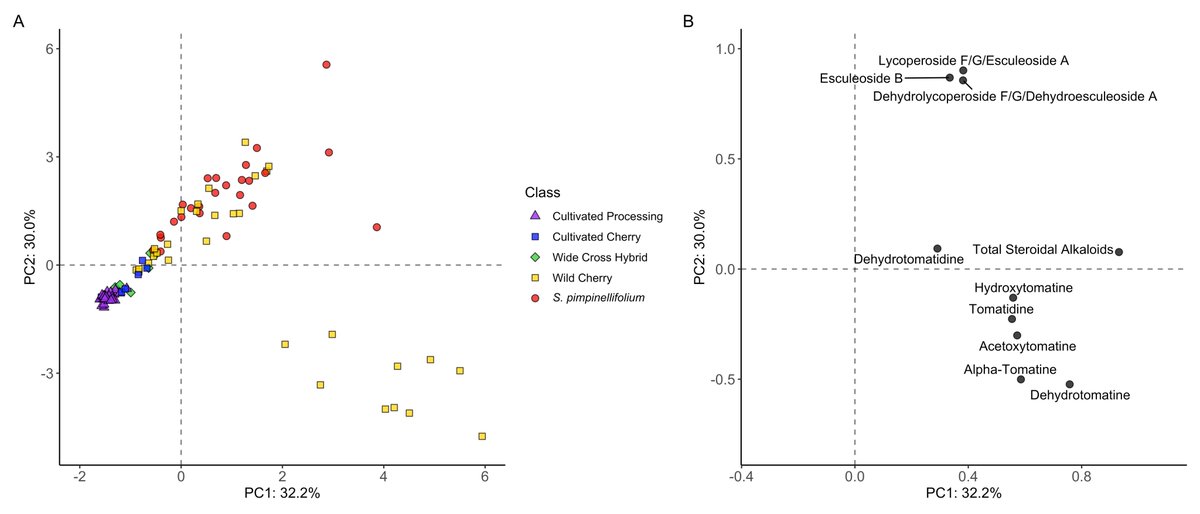Here to interrupt your doom-scrolling with our latest pre-print about #tomato steroidal alkaloids and genetic diversity! Why care? Take 30 seconds to find out..
https://www.biorxiv.org/content/10.1101/2021.01.06.425594v1
https://www.biorxiv.org/content/10.1101/2021.01.06.425594v1
People have known for a long time that eating tomatoes can lower your risk for lots of diseases, like prostate cancer, in addition to making any meal substantially better (Don't like tomatoes? Fight me...)
For a long time, most researchers thought lycopene was the compound in tomatoes that give them their health benefits, since tomatoes are the biggest source of lycopene in American diets.
Researchers found that lycopene was able to do *something* in terms of slowing down cancer development in vitro or in vivo, but whole tomato consumption always seemed to have an edge. Maybe there's something else besides lycopene??
Recently, that question was put to the test to see if having more circulating lycopene leads to better health outcomes:
https://www.nature.com/articles/s41598-017-05568-7 https://pubmed.ncbi.nlm.nih.gov/28795489/
https://www.nature.com/articles/s41598-017-05568-7 https://pubmed.ncbi.nlm.nih.gov/28795489/
So more lycopene doesn't necessarily mean more benefit. Weird... Maybe what little lycopene we absorb is doing the most it can or maybe there's other things working together.
Untargeted metabolomics used in those studies above showed that steroidal alkaloids were one of the chemical features that best discriminated animals that ate tomatoes vs. animals that didn't.
Compared to lycopene, hardly anyone has investigated what these compounds are, how they're made, and what genes control their production.
So way back in the 90's, this scientist named Dr. Charlie Rick (who rightfully deserves his own thread) found these weird tomatoes in Peru that had really high levels of alpha-tomatine (a steroidal alkaloid) in ripe fruits. https://www.pnas.org/content/91/26/12877
But there wasn't a lot of research after that. They're hard to measure and it wasn't entirely clear what their purpose was outside of defending tomato plants from bugs and germs.
A @USDA_ARS scientist named Mendel Friedman did some work with them in the late 90's and early 2000's and found that they were able to bind to cholesterol. Some other groups also found that they inhibited cancer cell development in vitro.
In the last 10 years, a few groups around the world started focusing on them because they thought that tomato steroidal alkaloids might be bad to eat or at the very least, make tomatoes taste bitter.
And at this point, most of the biosynthetic pathway for how these compounds are made has been worked out. But several steps still remain unknown.
We decided to put together the most genetically diverse group of red-fruited tomatoes we could, grow them in different places, and profile them using a sensitive and quantitative method we developed not too long ago https://www.frontiersin.org/articles/10.3389/fpls.2020.00767/full
Most of these tomatoes were already genotyped in an earlier study, so we could use a genome wide association analysis ( #GWAS) to try to figure out where genes might be that are related to steroidal alkaloids.
We also took some of those weird, high alpha-tomatine tomatoes I mentioned a few tweets ago and crossed them with modern-day processing tomatoes to start to figure out what genes were contributing to that trait.
We found hundreds of associations through our #GWAS, so it was tricky to figure out what to focus on. We used our second population to help validate our findings from the GWAS.
That narrowed things down a lot! We found a QTL on chromosome 3 that seems to be controlling multiple steroidal alkaloids in the beginning of the pathway!
This is especially cool because this finding mirrors the phenotypic diversity we saw in our population. Tomatoes that all came from that same place in Peru where the high alpha-tomatine tomatoes were from had the same QTL on chromosome 3.
No one has reported this QTL before and it appears that whatever it encodes (maybe a transcription factor? Some kind of transporter?) is coordinately regulating the pathway!
This is just one story to take away from the manuscript. There's so much more inside about the diversity in chemical profiles and concentrations of steroidal alkaloids in the red-fruited clade of tomato.
And if we want to learn more about how these compounds affect #health or #flavor, we now have characterized germplasm that we can use to start new populations for different purposes.
This project was one of the highlights of my PhD and could not have happened without the guidance, care, and funding from @CooperstoneLab, @Ohio_Tomato, and the #NCARS that's part of the @visitoadcr and @CFAES_OSU
And a special shoutout to @Gibson_Matthew_ who gave me some solid advice on making maps in R :)
Anyways, it feels super gauche tweeting about tomato stuff with everything going on in the US and abroad.
Please call #congress: (202) 224-3121
Please call #congress: (202) 224-3121

 Read on Twitter
Read on Twitter



